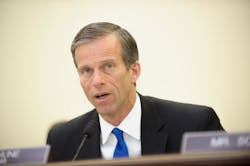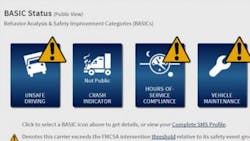With just two weeks to go before the federal government’s authority to fund highway and transit programs expires, the House and Senate on Wednesday moved along legislative packages that point to a last-minute showdown: Will the solution be a multi-year plan, as favored by Senate leaders, or a short-term extension, as just passed by the House?
In the upper chamber, the Commerce committee worked late to pass the ‘‘Comprehensive Transportation and Consumer Protection Act of 2015,’’ a multi-year bill that features a range of amendments offering “critical regulatory and consumer protection reforms,” including substantial changes to trucking industry oversight.
The 13 to 11 vote was along party lines, with committee chair Sen. John Thune (R-SD) suggesting “a good deal of misinformation” had created the impression that the bill was not a bipartisan one. He argued that at least half of its 500 pages contained provisions previously agreed upon by both parties.
“Today, the committee incorporated important bipartisan safety enhancements and approved a bill that enacts critical regulatory reforms,” Thune said. “We worked hard to include input from both sides of the aisle, and we now have a bill that can move forward towards enacting a multi-year transportation reauthorization bill versus passing additional short-term extensions.”
However, Sen. Maria Cantwell (D-WA), ranking member, argued that the committee had abandoned its bipartisan tradition and that the bill contained “no Democratic perspective at all.” Pointing to recent hearings over automobile safety recalls, she explained that Congress needs to “add teeth” to regulations when provided evidence of corporate negligence, “not just a shrug.”
“Sadly, this bill doesn’t do enough,” Cantwell said. “In fact, this bill actually walks back safety provisions that could lower the age to drive big rigs on interstates from 21 to 18, and some of the rail provisions that have been added to the bill are no better.”
Democrats called for votes to strike a number of provisions in the bill, but those votes were unsuccessful. Sen. Cory Booker (D-NJ) also proposed an amendment to increase the minimum insurance level for trucking companies, which was defeated. Other amendments were pulled from consideration and will likely be reintroduced on the floor of the Senate, including language by Sen. Tom Udall (D-NM) to limit truck size.
The Commerce bill will be joined with the Environment and Public Works (EPW) committee’s DRIVE Act for consideration by the full Senate, likely early next week. The Senate Finance committee, which must come up with a way to pay for a multi-year bill, is reportedly working on offsets that would come out of changes to the federal employee retirement program.
Trucking provisions
Many of the trucking reforms contained in the bill mirror legislation introduced last month by Sen. Deb Fischer (R-NE), chairman of the transportation subcommittee.
Under the commercial vehicle portion of the bill, the Compliance, Safety, Accountability (CSA) reform section calls for a study to evaluate whether the program’s current methodology “reliably” predicts future crash risk for motor carriers, and whether the system provides similar enforcement benefits for large and small motor carriers.
Another section includes National Hiring Standards for Motor Carriers and the Drug Free Commercial Driver Act of 2015. The former specifies that a carrier is fit to be hired if it does not have an unsatisfactory safety fitness determination, and that shippers would be protected in court if they verified the carrier’s suitability under the standard. The latter would allow the use of hair testing for pre-employment and subsequent random screening for controlled substance use by commercial vehicle drivers.
A third subtitle, Transparency and Accountability, sets out a number of regulatory reforms including specific requirements for any rulemaking associated with minimum levels of financial responsibility, a process for regulatory relief, and standards for commercial vehicle inspectors.
Another section, the Comprehensive and Key Safety Reform Act, adds additional reforms. Specifically, it calls on FMCSA to consider the effects of any final rule on carriers with “differing characteristics” and to formulate estimates and findings on “the best available science.” This section also would require the Secretary of Transportation, prior to a major rulemaking concerning motor vehicle and driver programs, to determine whether to proceed with a negotiated rulemaking or to issue an advance notice of proposed rulemaking requesting public comment.
A section devoted to state matters would, among other things, authorize DOT to establish a six-year pilot program to allow states to enter into compacts to allow for appropriately licensed truck drivers between the ages of 18 and 21 to travel in interstate commerce.
House extension
Earlier Wednesday, the House voted 312-119 to approve an $8 billion bill to extend MAP-21 into December, the fourth extension of the current highway funding program.
Republicans made the case that an extension will give Congress more time to work on tax reform measures to adequately fund a multi-year transportation plan.
“The House has now taken the first step to providing the stability and predictability that our highway program needs. This plan gives us our best opportunity to produce and pass a long-term bill to rebuild America’s roads, bridges, and other infrastructure this year,” House Ways and Means Committee Chairman Paul Ryan (R-WI) said. “This is the right approach, and the Senate should move quickly to adopt this extension—without any unrelated measures—so that we can provide some certainty and get to work on a multi-year plan.”
Ahead of the vote, House Democrats reintroduced the GROW AMERICA act, the Obama administration’s half-trillion dollar, six-year plan, which also features tax reform measures.
“This bill represents what the House should be taking up today on surface transportation,” said Rep. Pete DeFazio (D-OR), ranking member on the Transportation committee. “The bill provides certainty by authorizing highway, transit, and safety programs for six years. It is what States, counties, cities, construction contractors and transportation workers want. Not a five month stop-gap, which is what Republican leadership brought to the floor.”





